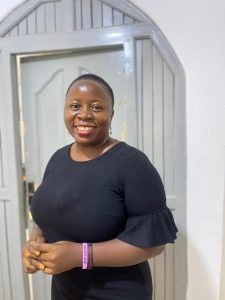Decolonial justice at the border: #ShiftThePower in Bogotá
12 Feb 2024
This blog originally appeared in Alliance magazine’s special feature on the #ShiftThePower Global Summit.

Massah Esther Nyally Bockarie, Program Coordinator at We Are Purposeful
I intended to share the incredible conversations I had at the conference. On our arrival, I vividly remember being on the bus with Soheir, a Palestinian and Ruth, a Kenyan who are both human rights lawyers and activists. Our discussion revolved around Palestine and our expectations for the Summit.
The weaving conversations leading up to the #ShiftThePower Global Summit had been radical, thought-provoking, and powerful. I was eager for the next three days, anticipating they would hold the same energy.
During breakfast the next morning, I noticed that each of us was eager to drive change in power-laden and unjust systems. Our conversations touched on various topics, ranging from development work to aid, capitalism, and ableism. These urgent and informal discussions continued throughout our time together, bridging experiences and knowledge from different perspectives. Such interactions kept occurring during breakfast, tea breaks, bus rides, etc. – for me, this was the most magical part of the Summit.
Purposeful is intentionally working on decolonizing systems. In fact, the foundation of our organization was to be an anti-traditional NGO/INGO, from our globalized salary system to our four day work week. It’s easier to believe these structures are changing everywhere else. Despite my initial optimism during the Summit, returning home made me realize that while the 700 participants, their colleagues, and families might be on this transformative journey together with Purposeful, there is much more work to be done.
In the bucket discussion “Moving beyond logos, egos, siloes and halos – reimagining our own systems, organizational and governance structures” two statements stood out, both made by a young person of African descent. Their second statement, a vision for the world in 100 years, resonated with me: “In a hundred years, none of us would need a visa to come here.” This hit home. I understood the frustration felt by those unable to attend and those who struggled to get there at all as a result of visas.
I had my visas – one for the U.K. and one for Colombia. Yet, When a Colombian border control member of staff took her phone out to photograph the front of my passport, googled and later took more photos of the inside, I was a bit worried. I was leaving her country, right? Such procedures would be only for those coming into the country, surely? Maybe she thought I was someone using Colombia to immigrate to the U.K. illegally. Whatever the case was, I made a simple request for help. She said,”No.”
It was the indignity that I had to suffer with my passport – the folding, turning, shaking of heads. What could have been the problem? No one would speak to me! When someone finally did, he was loud and obnoxious. “Why are you taking my photo?” “I’m not.” “Give me your phone.” I won’t, that’s not a part of your job. Yes, I was videoing as my passport was passed from one hand to another after my boarding pass triggered an alarm at the gate. He proceeded to throw my passport to the ground. My heart was truly broken. I exploded in fury, shouting at him while trying not to cry. After much time had passed and I showed a photo of my e-visa, they finally let me go.
Even in Morocco, in my own continent of Africa, I was not allowed to leave the airport without the “right” passport or visa. Being stuck in a lounge while others were taken to a hotel and touring the city hurt a little, while waiting for 24 hours until I could fly. I recall a woman challenging the staff, demanding for better treatment as we were shoved into that lounge. I could have cried in those moments, but I was just too tired for anything. Was this just another example of trickle-down inequality?
These experiences highlights how colonial and racist systems persist, imposing mistrust on black and brown bodies and limiting access to opportunities. These incidents reminded me of the scrutiny communities and organizations in the Global South undergo. My passport, like a small NGO in the Global South, under due diligence. Them, a microscope scrutinizing the language, budget, activities and any wrong could disqualify it for good. It was scary. The individuals in the border control office face no consequences, mirroring the lack of accountability seen in INGOs and their activities in the Global South. All of which we need to dismantle.
I found joy when an overlooked old woman beside me was cared for. Two women eventually noticed her deteriorating state, provided care and I assisted in contacting her family. This simple act contrasted with complex structures perpetuating neocolonialism and racism, leaving me inspired by the potential for genuine and dismantled philanthropy as discussed at the conference.
Care for those around us and the environment that didn’t require structures? It was powerful what philanthropy in its simplest form can be and that change is indeed possible. What we believe to be change has been happening in our communities. The conversations and hopes at the conference are already manifesting in communities and all of us are ambassadors in shaping this new system.
By: Massah Esther Nyally Bockarie, Program Coordinator at We Are Purposeful

